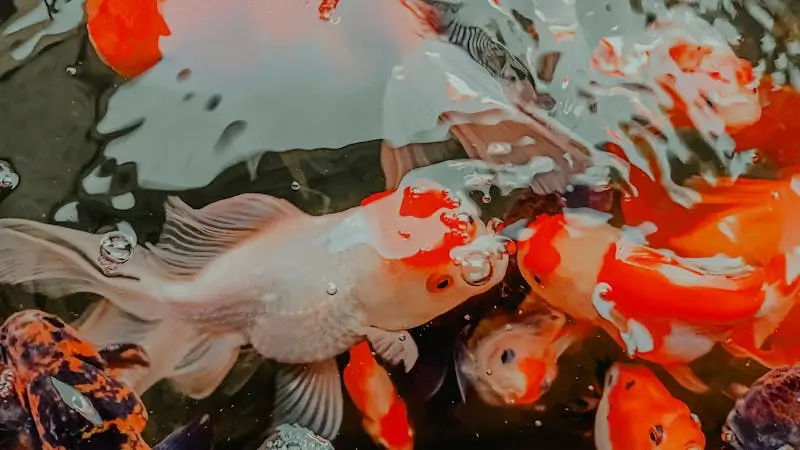Proper nutrition is crucial for the health and vitality of your goldfish. With a variety of foods available, understanding the best options can help ensure your goldfish live a long and healthy life. In this ultimate guide to goldfish nutrition, we’ll explore everything you need to know about feeding your goldfish, including the types of food to choose, feeding schedules, and common nutritional issues.
Understanding Goldfish Dietary Needs
Goldfish Nutrition is not just about filling their stomach; it’s about providing balanced, nutritious food that supports their overall health.
1. Basic Nutritional Requirements
Goldfish Nutrition: Goldfish need a balanced diet consisting of proteins, fats, carbohydrates, vitamins, and minerals.
- Proteins: Essential for growth and tissue repair. Look for foods with high-quality protein sources.
- Fats: Provide energy. Moderation is key, as excess fat can lead to health issues.
- Carbohydrates: Offer energy and support digestive health.
2. Types of Goldfish Food
Goldfish Nutrition: Different types of food cater to various nutritional needs.
- Flakes: Convenient and widely available. Suitable for most goldfish but can cause water quality issues if overfed.
- Pellets: Often more nutritious than flakes and come in various sizes. Good for maintaining water quality.
- Frozen and Live Foods: Include options like brine shrimp, daphnia, and bloodworms. They provide high protein and enrichment.
Feeding Guidelines
Goldfish Nutrition: Proper feeding practices are essential for maintaining a healthy goldfish diet.
1. Frequency and Amount
Goldfish Nutrition: How often and how much you feed your goldfish impacts their health.
- Frequency: Feed your goldfish 2-3 times a day. Offer only what they can consume in a few minutes.
- Amount: Avoid overfeeding to prevent waste buildup and water quality issues.
2. Feeding Techniques
Goldfish Nutrition: Employing proper feeding techniques can improve your goldfish’s diet.
- Varied Diet: Rotate between different types of food to ensure balanced nutrition.
- Spot Feeding: Observe your goldfish to ensure they are eating and not hoarding food.
Specialized Goldfish Foods
Goldfish Nutrition: Some goldfish may benefit from specialized diets.
1. High-Quality Goldfish Food
Goldfish Nutrition: Look for high-quality food with specific nutritional formulations.
- Color Enhancers: Foods with color enhancers help maintain and enhance your goldfish’s natural coloration.
- Growth Formulas: Specially formulated foods can support optimal growth and development, especially for young goldfish.
2. Medicinal Foods
Goldfish Nutrition: Medicinal foods can aid in treating specific health issues.
- Anti-Parasitic Foods: Used to treat or prevent parasitic infections.
- Digestive Health Foods: Contain ingredients that support digestive health and prevent common issues like constipation.
Nutritional Issues and Solutions
Goldfish Nutrition: Identifying and addressing nutritional issues can prevent health problems.
1. Overfeeding
Goldfish Nutrition: Overfeeding is a common issue that can lead to health problems.
- Symptoms: Signs include bloated stomach, swim bladder issues, and poor water quality.
- Solution: Adjust feeding amounts and schedules to avoid overfeeding.
2. Nutritional Deficiencies
Goldfish Nutrition: Nutritional deficiencies can cause various health problems.
- Symptoms: Signs include poor growth, color loss, and lethargy.
- Solution: Ensure a balanced diet and consider supplementing with high-quality foods if deficiencies are suspected.
Environmental Considerations
Goldfish Nutrition: The tank environment plays a role in maintaining proper nutrition.
1. Water Quality
Goldfish Nutrition: Poor water quality can affect your goldfish’s ability to digest food.
- Monitoring: Regularly test water parameters like ammonia, nitrite, and nitrate levels.
- Maintenance: Perform routine water changes and clean the tank to maintain optimal conditions.
2. Tank Temperature
Goldfish Nutrition: Temperature affects digestion and feeding behavior.
- Optimal Range: Maintain water temperature between 65-75°F (18-24°C) for most goldfish.
- Temperature Fluctuations: Avoid sudden changes in temperature that can stress your goldfish and impact their appetite.
Frequently Asked Questions
Goldfish Nutrition: Here are answers to some common questions about goldfish nutrition.
- How often should I feed my goldfish? Feed your goldfish 2-3 times a day with amounts they can eat in a few minutes.
- Can goldfish eat vegetables? Yes, occasional vegetables like peas or spinach can be a healthy addition.
- What should I do if my goldfish is not eating? Check water quality, temperature, and ensure the food is fresh. Consider adjusting feeding practices.
Conclusion
Goldfish Nutrition: Providing balanced and varied nutrition is key to a healthy goldfish.
By understanding the dietary needs of your goldfish and following proper feeding practices, you can ensure your aquatic pets thrive and enjoy a long, healthy life. Remember to choose high-quality foods, monitor their health, and maintain optimal tank conditions for the best results.
Thank you for reading our ultimate guide to goldfish nutrition. For more tips and expert advice, stay tuned to GoldfishCorner.com. Happy fishkeeping!

